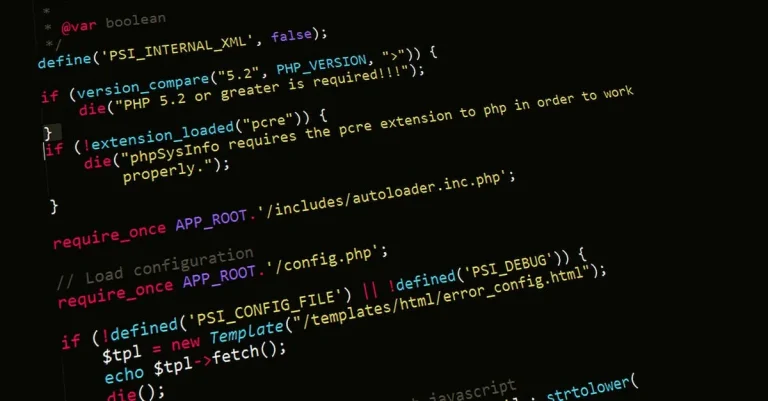How To Know If Computer Science Is For You
With technology continuing to transform our world, it’s no surprise that computer science has become an intriguing field for many. However, succeeding in computer science requires specific skills and interests.
By evaluating your abilities in programming, problem-solving, mathematics, and perseverance, you can determine if computer science aligns with your talents.
If you’re short on time, here’s a quick answer to your question: Take programming classes, work on coding projects, participate in math contests, collaborate on technical teams, and introspect on your drive to debug and improve. If you enjoy these experiences, computer science may be a great fit.
Assess Your Interest in Programming
If you are considering a career in computer science, it is important to assess your interest in programming. Programming is a fundamental skill in the field of computer science, and having a passion for it can greatly contribute to your success.
Here are a few ways to gauge your interest in programming:
Take intro programming classes in high school or college
One way to assess your interest in programming is to take introductory programming classes in high school or college. These classes will give you a taste of what programming is all about and allow you to explore the basics of coding.
By taking these classes, you can determine if you enjoy the problem-solving aspect of programming and if it is something you want to pursue further.
Complete online programming tutorials and courses
Another way to assess your interest in programming is to complete online programming tutorials and courses. There are many websites and platforms available that offer free or paid programming courses for beginners.
By following these tutorials and completing coding exercises, you can get a sense of whether or not programming is something that excites you and keeps you engaged.
Build personal coding projects
If you want to take your assessment a step further, try building personal coding projects. This could be anything from a simple calculator to a more complex web application. By working on personal coding projects, you can see how motivated and passionate you are about solving problems and creating something from scratch.
It will also help you develop your programming skills and give you a sense of accomplishment.
Contribute to open source projects
Contributing to open source projects is another way to assess your interest in programming. Open source projects allow you to collaborate with other developers on real-world projects. By contributing to these projects, you can gain valuable experience, learn from more experienced developers, and see how much you enjoy working on larger-scale coding projects.
Remember, assessing your interest in programming is an important step in determining if computer science is the right path for you. It’s okay to try different programming languages and projects to find what truly excites you.
By exploring different avenues, you can gain a better understanding of your passion for programming and make an informed decision about your future career.
Gauge Your Problem-Solving Skills
One of the key aspects of computer science is problem-solving. If you enjoy finding solutions to complex problems, then computer science might be the right field for you. Here are a few ways to gauge your problem-solving skills:
Do puzzles and brain teasers
Engaging in puzzles and brain teasers can help you develop your problem-solving skills. These activities require you to think critically and come up with creative solutions. Whether it’s solving a Rubik’s cube or completing a crossword puzzle, these challenges can give you an indication of how well you can tackle problems.
Take advanced math and science courses
Computer science heavily relies on mathematical and scientific principles. Taking advanced courses in math and science, such as calculus, physics, or chemistry, can help you develop the analytical thinking skills needed in computer science.
These courses will also give you a taste of the logical reasoning required in the field.
Participate in math competitions
Participating in math competitions can be a fun and challenging way to test your problem-solving abilities. Competitions like the International Mathematical Olympiad or local math competitions can push you to think outside the box and tackle complex mathematical problems.
These experiences can provide valuable insights into your aptitude for computer science.
Introspect on how you tackle troubleshooting
Think about how you approach troubleshooting when faced with technical issues. Are you naturally curious and persistent in finding solutions? Do you enjoy exploring different possibilities and experimenting with different approaches? These are traits commonly found in successful computer scientists.
Reflecting on your troubleshooting skills can help you determine if computer science aligns with your problem-solving abilities.
Remember, these are just a few ways to gauge your problem-solving skills. It’s important to keep in mind that computer science is a broad field with various sub-disciplines. So even if you don’t excel in one particular area, there might still be other aspects of computer science that interest you and align with your skills and passions.
Determine Your Math Aptitude
The field of computer science heavily relies on mathematical concepts and problem-solving skills. If you are considering pursuing a career in computer science, it is important to assess your math aptitude to determine if it is the right fit for you.
Here are some steps to help you gauge your mathematical abilities:
1. Take calculus and discrete math courses
Calculus and discrete math are fundamental areas of mathematics that are crucial in computer science. Taking courses in these subjects will introduce you to important concepts such as limits, derivatives, integrals, and discrete structures.
These courses will not only help you develop a strong foundation in math but also enhance your problem-solving and analytical skills.
2. Review trigonometry and algebra foundations
Trigonometry and algebra form the building blocks of many mathematical concepts used in computer science. Reviewing these foundational topics will help you understand complex equations, functions, and geometric principles.
By having a solid understanding of trigonometry and algebra, you will be better prepared to tackle advanced computer science courses.
3. Practice logic and critical thinking skills
Computer science involves logical reasoning and critical thinking. Engaging in activities that enhance these skills can give you a better understanding of your aptitude for computer science. Solve puzzles, engage in logical reasoning exercises, and practice critical thinking to sharpen your mind and improve your problem-solving abilities.
4. Consider taking the Putnam exam
The William Lowell Putnam Mathematical Competition, commonly known as the Putnam exam, is a prestigious mathematics competition for undergraduate students. Participating in this exam can provide you with a challenging opportunity to test your mathematical abilities and problem-solving skills.
Even if you don’t achieve a high score, the experience gained from preparing for and taking the exam can be valuable in determining your aptitude for computer science.
Remember, while a strong math aptitude can be beneficial for pursuing a career in computer science, it is not the sole determining factor. It is important to consider other aspects of the field, such as programming, logic, and problem-solving abilities.
Exploring different areas of computer science and gaining hands-on experience can also help you determine if it is the right fit for you.
Evaluate Your Persistence and Patience
Talk to computer science students and professionals
One way to determine if computer science is the right field for you is by talking to current computer science students and professionals. They can provide valuable insights about their experiences and the challenges they have faced.
Ask them about the level of persistence and patience required to succeed in the field. Their firsthand experiences can give you a realistic understanding of what to expect.
Reflect on how you handle obstacles and failure
Computer science often involves solving complex problems and encountering obstacles along the way. Reflecting on how you handle obstacles and failure can give you an idea of whether you have the persistence and patience required for this field.
Do you tend to give up easily, or do you enjoy the challenge of finding solutions? Computer science requires a mindset that embraces learning from failure and continuously improving.
Consider if you enjoy focused, detail-oriented work
Computer science involves working with intricate algorithms, code, and data structures that require attention to detail. If you enjoy digging deep into problems, analyzing data, and solving puzzles, then computer science may be a good fit for you.
The ability to focus for long periods of time and pay attention to the smallest details is crucial in this field. Consider if you find enjoyment in these types of tasks.
Determine if you can persevere through challenges
Computer science is a field that often presents challenges and requires perseverance. The process of debugging code, troubleshooting errors, and finding innovative solutions can be time-consuming and frustrating. However, the ability to persevere through these challenges is essential for success.
Ask yourself if you have the determination and resilience to keep pushing forward when faced with difficult problems.
By evaluating your persistence and patience, talking to professionals, reflecting on your problem-solving abilities, and considering your enjoyment of detail-oriented work, you can gain a better understanding of whether computer science is the right field for you.
Remember that everyone’s journey is different, and it’s important to choose a path that aligns with your interests and strengths.
Identify Your Learning Style
When considering a career in computer science, it is important to understand your learning style. This will help you determine if computer science is the right fit for you. Here are some key factors to consider:
Determine if you prefer learning concepts through practical projects
Some individuals learn best by getting hands-on experience and working on practical projects. If you enjoy building things and solving problems through real-life applications, computer science may be a great fit for you.
Building websites, developing software, and creating mobile applications are just a few examples of the practical projects you can expect to work on in the field of computer science.
Assess whether you like collaborating in a group or working solo
Computer science offers a wide range of opportunities for both collaborative work and independent projects. If you thrive in group settings and enjoy brainstorming ideas with others, computer science provides ample opportunities for teamwork.
On the other hand, if you prefer working independently and taking full ownership of your projects, there are plenty of solo projects in computer science as well. Reflect on your preferred working style to determine if computer science aligns with your preferences.
Find out if theory-focused learning is engaging or dull for you
Computer science involves a fair amount of theoretical knowledge and understanding. If you enjoy diving deep into concepts and theories, computer science will provide you with a wealth of engaging material to explore.
However, if you find theory-focused learning to be tedious and prefer more practical, hands-on learning, you may want to consider if computer science is the right fit for you. It’s important to have a genuine interest in the subject matter to excel in this field.
Remember, these are just a few considerations to help you determine if computer science is the right fit for you. It’s always a good idea to explore further and gather more information. You can visit websites like Codecademy or edX to gain access to online courses and resources that can help you get a better understanding of computer science.
Ultimately, your passion and enthusiasm for the subject will be the key deciding factor in pursuing a career in computer science.
Talk to Your Faculty and Peers
When considering a major in computer science, it’s essential to gather insights from those who are already immersed in the field. One way to do this is by reaching out to computer science professors and upperclassmen.
They can provide valuable advice and share their experiences, giving you a better understanding of what it’s like to study computer science.
Reach out to computer science professors and upperclassmen
Computer science professors are experts in their field and can offer guidance on various aspects of computer science. They can give you an overview of the curriculum, explain the different specializations within the field, and provide insights into potential career paths.
Upperclassmen who are already pursuing a computer science degree can share their firsthand experiences, including the challenges they faced and the opportunities they found.
Discuss coursework and career paths with your academic advisor
Your academic advisor is a valuable resource when it comes to selecting a major. They can help you understand the requirements for a computer science degree and guide you in choosing the right courses that align with your interests and goals.
Additionally, they can provide information on potential career paths within computer science and help you explore internship or research opportunities.
Join computer science student organizations on campus
Getting involved in computer science student organizations can be a great way to connect with like-minded peers and gain further insight into the field. These organizations often host events, workshops, and guest lectures, providing opportunities to learn from professionals in the industry.
By participating in these activities, you can expand your network and gain a deeper understanding of what it means to be a computer science student.
Remember, talking to faculty and peers is not only about gathering information but also about getting a sense of whether computer science is the right fit for you. Engage in conversations, ask questions, and listen to their experiences to help you make an informed decision about pursuing a degree in computer science.
Conclusion
Figuring out if computer science is the right fit requires honest self-reflection on your skills and interests in programming, math, problem-solving, critical thinking, persistence, collaboration and independent learning.
By evaluating your experiences in courses, competitions, coding projects and conversations with experts, you can determine if computer science aligns with your talents and passions.
We hope these tips have illuminated a path to deciding if computer science is for you. Trust your instincts, remain open to new self-discoveries, and know that your choice can evolve over time. The most important thing is pursuing work you find meaningful and engaging each day.







